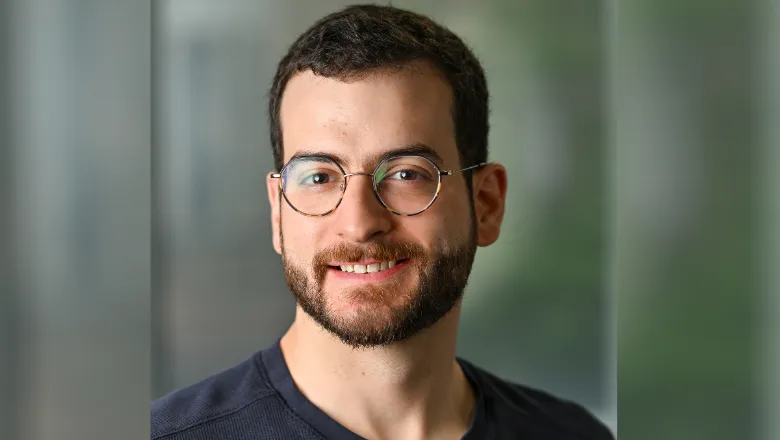“Science is a battleground of low-hanging fruit. We're now running out of well-behaved proteins, and the ones that are most important to a healthy body are not the nice, ordered ones."
Dr Luis Guerra
12 April 2024
King's chemist awarded prestigious fellowship to study cancer causing protein
The two-year Marie Skłodowska-Curie Actions Postdoctoral Fellowship could fund treatments for an ‘undruggable class’ of protein.

Dr Luis Guerra, a Postdoctoral Research Associate from the Department of Chemistry, has been awarded a distinguished Marie Skłodowska-Curie Actions Postdoctoral Fellowship to investigate how a change in structure to a complex protein could cause cancer.
The two-year fellowship will cover salary and provide an additional £10,000 of research funding a year for Dr Guerra to look at how p53, a complex protein which controls cell death, might fail due to naturally occurring chemical changes to the amino acids which form the protein.
p53 tells individual cells to destroy themselves if they are behaving improperly, like when a pre-cancerous cell is growing too quickly. It fails in half of all cases of cancer.
Historically, complex proteins such as p53 which lack a fixed shape and carry out their functions by binding to other proteins or DNA have been classified as ‘undruggable’, because they lack the defined pockets which drugs latch on to that enzymes have.
However, an understanding of how naturally occurring changes to amino acids, called post-translational modifications, can ‘turn off’ certain behaviour in proteins might provide an avenue for physicians to create medicines which prevent this possibly dangerous change.
By looking at the amino acid proline, and how it changes its rotation and shape through a process called isomerization, Dr Guerra aims to map what impact this commonly occurring phenomenon has on the function of p53 and whether it could be the root of its cancer spreading behaviour.
This will involve synthetically creating p53 proteins with proline variants that probe different aspects of this specific post-translational modification, then observing how this impacts p53’s interactions with other molecules as well as its basic structure. This will help develop a more complete understanding of the protein’s behaviour than ever before.
Through an understanding of how this modification changes the function of p53, Dr Guerra hopes that this will help make treatments that can target this and prevent cancer.
Furthermore, by understanding how proline isomerization impacts p53, it may be possible to develop drugs for similarly complex ‘undruggable’ proteins, which can cause neurodegenerative disorders.
Dr Guerra explains, “Science is a battleground of low-hanging fruit. We're now running out of well-behaved proteins, and the ones that are most important to a healthy body are not the nice, ordered ones.
“King’s is one of the only labs in the world capable of this kind of synthetic chemistry, and I’m very happy to be a part of it and continue to contribute to its story.”
Dr Luis Guerra
The study of disordered systems is foundational, and it will make a difference. By understanding how complex proteins that regulate important functions are impacted at this chemical level, we might be able to not just create better treatments for cancer but a whole host of medicines for diseases that are impacted by these ‘undruggable’ proteins, like Alzheimer’s Disease.
Reflecting on the award of the fellowship, Dr Guerra said “I would like to thank my supervisor Dr Manuel Muller and all his lab for the support they have given throughout this process, their help has been instrumental in pulling this together. I would also like to thank Professor Mark Wallace, whose expertise in investigating the properties of individual molecules will be vital to the project’s success.
“King’s is one of the only labs in the world capable of this kind of synthetic chemistry, and I’m very happy to be a part of it and continue to contribute to its story.”

